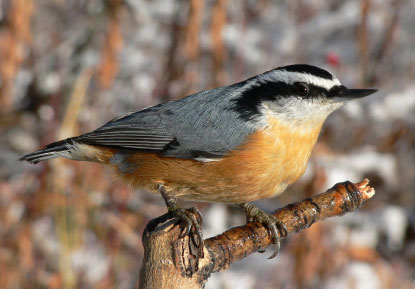
Warmth radiates from the crackling fire. Steam rises from a mug of hot cocoa at your side. You pause from the morning paper and look out the window at the bird feeders. A group of your regular visitors are busy consuming Aspen Song®. You wonder: “How do these beautiful animals survive such harsh conditions? Do they depend on me to keep those feeders filled?”
Your winter songbirds fall into two groups. Some are year-round residents who remain north knowing that an ample supply of natural seed stocks will be available throughout the winter. The others are visitors from the far north who have moved south seeking more dependable food supplies. The temperatures on the other side of your windowpane make that need for food even more important. Wild birds need to keep the metabolic fires stoked! Like you, birds are warm-blooded animals and they must maintain their body temperatures. Feathers provide important insulation. Communal roosting spots provide some species “collective warmth” at night. Black-capped Chickadees enter a form of semi-hibernation, reducing heartbeat, respirations, and body temperature on the coldest of nights. Overall, it is a healthy metabolism, fueled by ready food supplies, that keeps your songbirds alive in the winter.
So once you begin feeding, are you obliged to continue to spring? Margaret Brittingham at the University of Wisconsin’s Wildlife Ecology Department conducted a study of chickadees and found no difference in the survival rates of birds with access to feeders and others with only wild seed sources. The Black-capped Chickadees with access to feeders obtained 20 to 25% of their daily food from feeding stations. Wild birds can recognize dependable supplies of nutrition and will make your feeders a daily stop as they forage through the neighborhood. Keep a winter table set for them and they will provide hours of enjoyment. But they are not dependent on you once you begin feeding. If you miss the opportunity to fill the feeders for a day or two, the birds will adjust and substitute other sources until you can re-stock. The opposite can also occur. Occasionally, the native food sources can become unavailable to your birds after heavy snowfalls or ice storms. In these circumstances they will need your feeders to survive. When winter is at its worst, make sure Aspen Song® is available.
Reference
Journal of Field Ornithology, 63(2):190-194: Does Winter Bird Feeding Promote Dependency, by Margaret C. Brittingham and Stanley A. Temple.